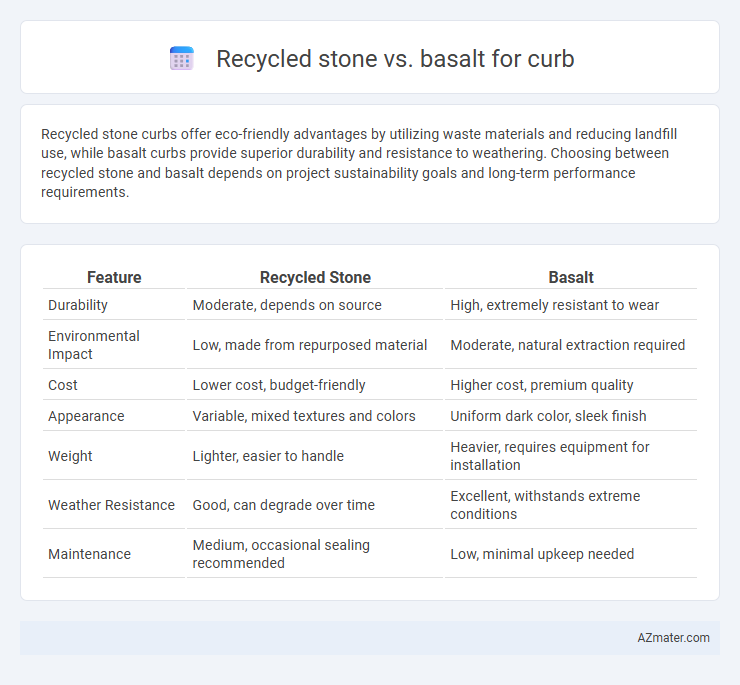Recycled stone curbs offer eco-friendly advantages by utilizing waste materials and reducing landfill use, while basalt curbs provide superior durability and resistance to weathering. Choosing between recycled stone and basalt depends on project sustainability goals and long-term performance requirements.
Table of Comparison
| Feature | Recycled Stone | Basalt |
|---|---|---|
| Durability | Moderate, depends on source | High, extremely resistant to wear |
| Environmental Impact | Low, made from repurposed material | Moderate, natural extraction required |
| Cost | Lower cost, budget-friendly | Higher cost, premium quality |
| Appearance | Variable, mixed textures and colors | Uniform dark color, sleek finish |
| Weight | Lighter, easier to handle | Heavier, requires equipment for installation |
| Weather Resistance | Good, can degrade over time | Excellent, withstands extreme conditions |
| Maintenance | Medium, occasional sealing recommended | Low, minimal upkeep needed |
Understanding Recycled Stone and Basalt for Curbs
Recycled stone for curbs offers an eco-friendly alternative by repurposing crushed concrete and masonry, providing durability and cost-effectiveness while reducing landfill waste. Basalt, a dense volcanic rock, excels in curb applications due to its high compressive strength, weather resistance, and natural dark coloration enhancing curb aesthetics and longevity. Selecting between recycled stone and basalt depends on project budget, environmental goals, and desired curb performance in urban infrastructure.
Material Composition and Sourcing
Recycled stone curbs are composed primarily of crushed concrete, brick, and stone fragments sourced from demolition waste, offering an eco-friendly alternative by reducing landfill use. Basalt curbs consist of dense volcanic igneous rock known for exceptional durability and natural resistance to weathering, sourced from specific basalt quarries with consistent mineral composition. Material sourcing for recycled stone emphasizes sustainability and local waste repurposing, while basalt relies on durable natural deposits often requiring transportation from specialized mining sites.
Durability and Strength Comparison
Recycled stone and basalt both offer robust options for curbs, with basalt exhibiting superior durability due to its igneous origin and high compressive strength typically exceeding 300 MPa. Recycled stone, while environmentally advantageous, may present variable strength depending on the source material but generally falls short of basalt's resistance to wear and weathering. Basalt's dense, fine-grained texture ensures enhanced longevity and minimal maintenance, making it a preferred choice for heavy-duty curb applications.
Environmental Impact Assessment
Recycled stone for curbs significantly reduces environmental impact by diverting construction debris from landfills and lowering the need for quarrying virgin materials, thus minimizing habitat disruption and carbon emissions. Basalt, while durable and long-lasting, requires energy-intensive mining and processing, leading to higher greenhouse gas emissions and landscape alteration. Choosing recycled stone enhances sustainability through resource conservation and lower embodied energy, making it a greener option in curb construction projects.
Cost Analysis: Recycled Stone vs Basalt
Recycled stone offers a cost-effective alternative for curbs, typically priced 30-50% lower than basalt due to lower material and processing expenses. Basalt, known for its durability and strength, demands higher upfront investment and increased labor costs during installation. Long-term maintenance costs tend to favor basalt, as recycled stone may require more frequent repairs or replacements in high-traffic areas.
Installation and Maintenance Requirements
Recycled stone curbs offer easier installation due to their lighter weight and uniform shape, reducing labor and equipment costs, while basalt requires more effort to cut and shape, increasing installation time. Maintenance for recycled stone curbs is minimal, with good resistance to cracking and weathering, whereas basalt curbs demand periodic sealing to prevent surface erosion and maintain appearance. Both materials provide durability, but recycled stone offers a more cost-effective solution with simpler upkeep for curb applications.
Aesthetic Appeal and Customization Options
Recycled stone offers a unique, weathered texture with varied color tones that enhance curb appeal through natural, eco-friendly aesthetics. Basalt provides a sleek, uniform dark gray appearance that complements modern design and allows precision cutting for clean lines and customized shapes. Customization options with recycled stone often include irregular patterns reflecting sustainable reuse, while basalt supports versatile finishing techniques like honing or polishing to achieve tailored curb styles.
Lifespan and Weather Resistance
Recycled stone curbs typically offer moderate lifespan and weather resistance, influenced by the variability in material composition, whereas basalt curbs provide superior durability, with lifespans exceeding 50 years due to their dense, volcanic origin. Basalt exhibits excellent resistance to freeze-thaw cycles, chemical erosion, and abrasion, making it highly suitable for harsh climates and heavy traffic areas. In contrast, recycled stone may degrade faster under extreme weather conditions, requiring more frequent maintenance or replacement.
Case Studies and Real-World Applications
Case studies reveal recycled stone offers sustainable benefits for curbs, showcasing reduced environmental impact and cost savings in urban infrastructure projects like Portland's green streets initiative. Real-world applications demonstrate basalt's superior durability and resistance to weathering, making it ideal for high-traffic curb installations such as those in Switzerland's mountainous regions. Comparative analysis highlights recycled stone's eco-friendly advantage while basalt's longevity ensures lower maintenance costs, guiding material selection based on project priorities.
Choosing the Right Material for Your Curb Project
Recycled stone offers an eco-friendly and cost-effective option for curb projects, providing durability and aesthetic appeal while reducing environmental impact. Basalt, known for its exceptional strength and resistance to weathering, ensures long-lasting performance and minimal maintenance in high-traffic areas. Selecting the right material depends on project budget, environmental goals, and the desired balance between sustainability and structural integrity.

Infographic: Recycled stone vs Basalt for Curb
 azmater.com
azmater.com